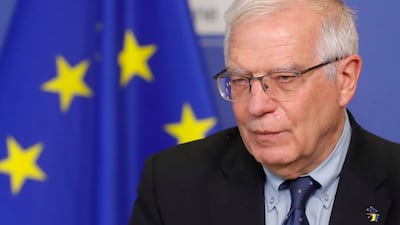The European Union announced a pause in the Iran nuclear talks on Friday, days after last-minute demands from Russia complicated negotiations and dampened hopes that a deal was imminent in Vienna.
Josep Borrell, the EU's foreign policy chief, said a final text was "essentially ready and on the table" but that an interruption was "needed due to external factors".
Although he did not specify these, the stumbling block in the talks came after Russia sought to widen the scope of negotiations by discussing sanctions linked to its invasion of Ukraine.
The move, regarded by analysts as a ploy to gain leverage over western powers, threatened to derail the 11-month talks aimed at getting the US and Iran back on board with the 2015 nuclear pact.
British negotiator Stephanie Al-Qaq said she was "deeply disappointed" by the delay after expressing optimism as recently as last week that a deal was close.
She said the agreement was "likely to unravel" if the issues were not resolved in the next few days.
Britain, France and Germany are ready to do a deal now, while Iran and the US have "worked hard to resolve final issues," she said without explicitly pointing the finger at Russia.
Russian negotiator Mikhail Ulyanov, who has denied that his delegation is stalling the talks, met EU delegate Enrique Mora before the talks broke up on Friday and said work would continue to settle remaining issues.
Iranian Foreign Ministry spokesman Saeed Khatibzadeh said Tehran would remain focused on concluding the talks it has held with Britain, France, Germany, Russia, China and, only indirectly, the US.
He said the break in negotiations could give "momentum for resolving any remaining issue" before a "final return" to close the deal.
"No external factor will affect our joint will to go forward for a collective agreement," he said.
The Joint Comprehensive Plan of Action was intended to stop Iran acquiring a nuclear weapon, but since the US quit the deal and reimposed sanctions in 2018, Tehran has openly flouted the restrictions that were meant to keep nuclear armament a distant prospect.
The current round of negotiations on reviving the pact started in late November, after a previous break in talks was followed by a five-month gap. Western officials say the window of opportunity is closing because Iran's nuclear build-up would eventually make the nuclear deal futile.
Mr Borrell said on Friday that he would "continue to be in touch with all JCPOA participants and the US to overcome the current situation and to close the agreement".
Russia said last week it was demanding guarantees that Western sanctions imposed on its economy after its invasion of Ukraine would not affect its trade with Iran.
As with the original agreement in 2015, Moscow had been expected to play a role in the enforcement of any fresh deal, for example by receiving shipments of enriched uranium from Iran. Russia has denied it is stalling the talks.
Before the break was announced, the US had said a deal remained close and could even be reached "in the coming days", echoing what had been an optimistic tone from western diplomats until Russia's intervention.
"It's really down to a very small number of outstanding issues," State Department spokesman Ned Price said at a news conference, without mentioning any new demands from Washington.
"But the reason these particular issues are outstanding is because they are among the most difficult ones."
Iran’s Supreme Leader, Ayatollah Ali Khamenei, who has the final say in major state policies, said his country would not give up on elements of "national strength", such as nuclear progress and regional influence.


